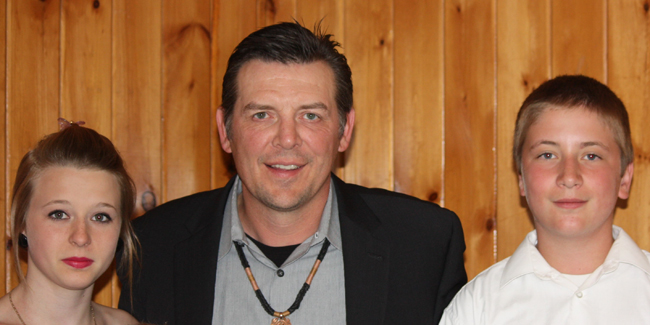Theo Fleury finally feels like a winner

SUDBURY – Theo Fleury didn’t feel like a winner until years after he played on hockey teams that won the Stanley Cup and an Olympic gold medal.
“We carry the shame for many years and we can feel like we are the only ones this has happened to,” he told the audience at the 2013 Valley East Sports Hall of Fame banquet, recalling his sexual abuse as a junior hockey player and alcohol addiction as a professional.
Fleury reached hockey stardom as a rookie with the Calgary Flames when they won the Stanley Cup in 1989 and was a member of the acclaimed 2002 team that won the Olympic gold in Salt Lake City.
His story – one that has also made Fleury a best-selling author — starts in the small town of Russell, Manitoba where at the age of six he fell madly in love with ice hockey. It took a lot of determination and perseverance for a five-foot-six skater to make it.
Despite his athletic success, he battled alcohol and drug addiction in an attempt to mask the pain of sexual abuse inflicted by his junior league coach, Graham James, who was subsequently charged and is serving jail time for sexually assaulting a number of young hockey players.
It was returning to his Metis heritage that began his long journey of healing, says Fleury. He described his dark days as having a damaged spirit but he eventually found healing in the aboriginal ceremonies, and credits the experience for giving him his life back.
“I was an alcoholic my entire hockey career,” he told his June 8 audience. “When I stepped on the rink I never had to think about what I was doing, I had been playing since I was six years old.”
Fleury eventually said goodbye to his hockey career in 2003 when his addictions started to interfere with his game and his family.
“I started to get into trouble with the NHL. They sent me to treatment centers and tried to help, but you can’t help someone who doesn’t want help. Eventually we agreed I would retire.”
It took a few more years before he finally addressed his addiction issues and confronted his past. Through sweat lodge ceremonies and sharing with elders he started to find some personal peace.
In 2009 he published his bestselling book, “Playing With Fire”, which tells his story as a hockey champion and survivor of child sexual abuse. Today he is an honorary Chief and band member of Siksika Nation in Alberta, and has made stops in over 60 First Nations communities to share his life experiences.
“When I visit, I sit down with the elders and ask them what is needed for the community. The one message he gets asked to share is that it is okay to ask for help.”
This past May he started the Victor Walk, a 10-day advocacy walk between Toronto and Ottawa to raise awareness and advocate healing. Money raised goes to three organizations that help educate and prevent child sexual abuse: Little Warriors, the Quinte Sexual Assault Centre and Siksika Nations.
“Molesting children is real and it is wrong and that is why I will be working for the rest of my life to raise awareness and stop the cycle of abuse,” he says.


